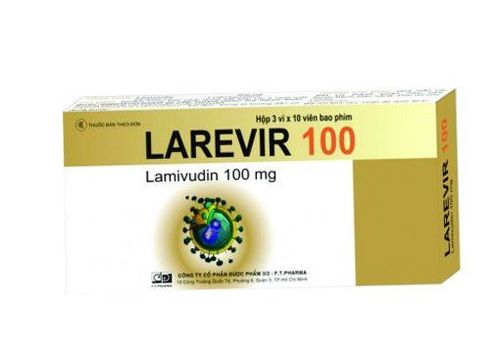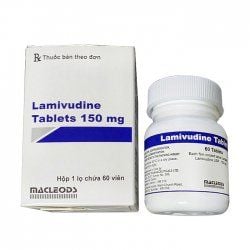This is an automatically translated article.
Abalamzi drug is made in the form of tablets with the main ingredients Lamivudine, Zidovudine and Abacavir. Medicines used in the control of HIV disease.
1. What disease does Abalamzi treat?
Each Abalamzi tablet contains the main ingredient 150mg Lamivudine, 300mg Zidovudine, 300mg Abacavir (as Abacavir sulfate) and other excipients.
All 3 active ingredients, Lamivudine, Abacavir and Zidovudine are nucleoside reverse transcriptase inhibitors (NNRTIs). They block the action of reverse transcriptase, an enzyme produced by HIV that allows it to infect cells and thereby make more viruses. Abalamzi is combined with at least one other HIV medicine, which lowers the amount of HIV in the blood and keeps it low.
Abalamzi does not cure HIV infection or AIDS, but it does reduce the amount of HIV in the body so that the immune system can work more effectively. This reduces the likelihood of HIV complications (such as cancer, new infections) and improves the person's quality of life.
Indications: Abalamzi is used alone or in combination with other HIV medicines to control HIV infection.
Contraindications: Do not use Abalamzi for people with hypersensitivity to any of the ingredients, patients with low neutrophils and children under 12 years of age.
2. How to use and dose of Abalamzi
How to use : Use Abalamzi by taking it directly. For best results, use Abalamzi at evenly spaced times. It is best to take this medicine at the same time each day.
Dosage:
Adults and children from 12 years of age and older: Take 1 tablet/time x 2 times/day; Dosage adjustment is required for patients with severe renal and hepatic impairment; Because this product has a fixed dose of Zidovudine, Abacavir and Lamivudine, it should only be used if your doctor determines that the doses of all 3 drugs in this product are appropriate for the user; It's also important to keep taking this medicine (and other HIV medicines) exactly as prescribed by your doctor, making sure you don't skip any doses. Do not increase your dose, use this medicine more often than prescribed, or stop taking it (or other HIV medicines) even for a short time unless directed to do so by your doctor. Skipping or changing doses without the guidance of a qualified doctor can increase the amount of virus in the body, make it difficult to treat infections (resistant) or reduce the effects of drugs. side use.
3. Side effects when using Abalamzi
Some of the unwanted effects that patients may experience when taking Abalamzi are:
The most common side effects when using Abalamzi are hypersensitivity (allergic reaction), nausea (feeling) illness), rash, vomiting, abdominal pain (stomach pain), diarrhea, headache, joint pain, cough, nasal symptoms (nose problems such as runny nose and irritation), muscle disorders, fever, lethargy (lack of energy), insomnia (difficulty sleeping), fatigue, irritability (feeling unwell), hair loss, and loss of appetite; Uncommon: Hypersensitivity reactions; Other side effects: There are signs of liver damage, treatment should be stopped immediately if the patient has a hypersensitivity reaction.
4. Be careful when using Abalamzi
Some things patients need to pay attention to before and while taking Abalamzi are:
Be careful when using the drug for the following subjects: Liver disease, cirrhosis caused by chronic hepatitis B, obese women, kidney failure , women in the first 3 months of pregnancy and during lactation; Abalamzi may cause dizziness; Be careful not to drive or use machines, or do anything that requires alertness until you can do it safely; Limit alcoholic beverages while taking Abalamzi. Alcohol can also increase your risk of pancreatitis and liver problems; Children may be more sensitive to the side effects of Abalamzi, especially pancreatitis. Drug Interactions: Avoid using Abalamzi with Stavudine and Ribavirin.
During the use of Abalamzi, patients need to follow the doctor's instructions to achieve high efficiency and avoid unwanted side effects.
Follow Vinmec International General Hospital website to get more health, nutrition and beauty information to protect the health of yourself and your loved ones in your family.













